YA Fiction by Ben Langdon
YA stands for Young Adult and is often seen as the category of book which sits between childrens’ fiction and adult fiction. This is a bit simplistic and, as most readers would already know, there really isn’t any kind of rigid barriers for the ages when it comes to reading. Readers want good books, so kids will often delve into ‘adult books’ if the story is right – and adults are the same.
If it’s not age-restricted, then what is YA Fiction? I would say that YA titles are engaging books, with interesting protagonists which often deal with social issues, particularly the ‘coming of age’ or ‘rites of passage’ story. This really isn’t much different from adult fiction, but YA also has the ability to push boundaries in form and language. Scott Westerfeld’s books incorprate invented language, whether it be in his contemporary teen fiction or science fiction series. YA protagonists are almost always teenagers, although the problems they face and must overcome are often very familiar to all readers.
So adults can enjoy YA Fiction as well, and probably already have read some of what is now termed YA. J. D. Salinger’s ‘A Catcher in the Rye‘ would probably be labelled YA if it was written today, and the phenomenon of Harry Potter shows that a story can certainly appeal to many age groups.
As I am about to embark upon a new bricks and mortar store (opening December 1st) I’ve given some thought as to how to market and display the YA section. Should the books be put in with adults or should the be separated? If there is a YA section, will that mean adults will bypass it? I hope not, and in an effort to get adults into the YA section I’ve decided to post these recommendations. If anyone else has read them then I’d ask you to start a conversation here in the comments section. I’d also like to hear about other people’s ideas on recommended YA books.
So… here are six great recommended books for young adults. If you haven’t ventured into YA before, these would be good starting points.
The Hunger Games , by Suzanne Collins
, by Suzanne Collins
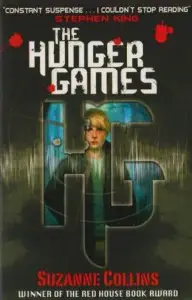
The first in a trilogy (Hunger Games, Catching Fire, Mockinjay) set in a future dystopic version of the USA where twelve Districts are forced to provide resources for the Capital and participate in the Hunger Games: an annual event where a boy and a girl from each district is chosen to go to the capital and fight to the death in a twisted combination of reality-TV, survival shows and the ancient Roman gladiators. It’s like the Survivor TV show but the contestants only get to leave when they’re dead or the last one standing. Brutal and unexpected, Suzanne Collins is not afraid to kill off her characters to illustrate the dangers of our current obsession with reality-TV, although she also highlights the essential goodness of human nature in a very bleak future.
Liar , by Justine Larbalestier
, by Justine Larbalestier
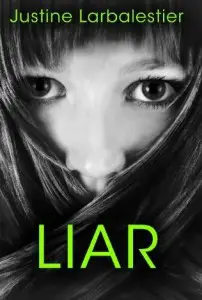
Micah is the narrator of this story, but she tells the reader that she is not to be trusted and that, in the past, she has been a compulsive liar. She unravels her life in a fragmented way which allows the reader to gradually piece together who she really is and what she has to do with the brutal murder of a boy at her school. This book is a psychological study of a complicated girl but also becomes something of a study on the reader too – what do we, as readers, expect when we sit down with a book, and are we able to ‘read between the lines’ and challenge what a narrator tells us? People either love this book’s twists and surprises, or feel cheated by the inconclusive nature of its protagonist’s story. I personally think it’s fantastic and loved the way it stayed with me weeks after I finished.
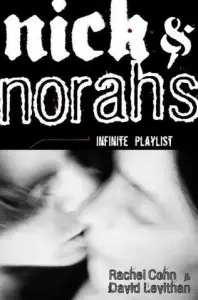
Nick & Norah’s Infinite Playlist , by Rachel Cohn and David Levithan
, by Rachel Cohn and David Levithan
Two authors, two characters. One night in New York City. This is a really fun and optimistic story told in alternate chapters by two authors dripping with cool dialogue. Unlike a lot of other stories set in New York City this one only sees excitement and energy in the city – there is never any real sense of danger, even though the story takes place over a single night. Nick and Norah will charm you, the New York music scene will captivate you, and the dialogue will leave you thinking that you really do know these people. Frequent swearing, but not in an aggressive way, this book resonates with authenticity. And it’s a really nice, positive and happy-ending kind of book.
Two authors, two characters. One night in New York City. This is a really fun and optimistic story told in alternate chapters by two authors dripping with cool dialogue. Unlike a lot of other stories set in New York City this one only sees excitement and energy in the city – there is never any real sense of danger, even though the story takes place over a single night. Nick and Norah will charm you, the New York music scene will captivate you, and the dialogue will leave you thinking that you really do know these people. Frequent swearing, but not in an aggressive way, this book resonates with authenticity. And it’s a really nice, positive and happy-ending kind of book.
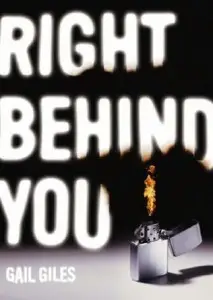
Right Behind You , by Gail Giles
, by Gail Giles
When Kip was nine years old he set his seven year old neighbour on fire. This story is told from Kip’s perspective, from when he is incarcerated in an institution, to when he is released into a new state and a new identity. It may sound horrific but Kip is never shown to be a monster – the reader is able to sympathise with him immediately, even when he himself finds it difficult to think of himself as anything except a monster. Gail Giles is able to write in a simple, yet powerful way, so that you may find yourself unable to put the book down. Kip’s path of redemption isn’t easy, but the journey he (and the author) takes is heartfelt. You might get a tightness in your throat and a tear in your eye with this one.
When Kip was nine years old he set his seven year old neighbour on fire. This story is told from Kip’s perspective, from when he is incarcerated in an institution, to when he is released into a new state and a new identity. It may sound horrific but Kip is never shown to be a monster – the reader is able to sympathise with him immediately, even when he himself finds it difficult to think of himself as anything except a monster. Gail Giles is able to write in a simple, yet powerful way, so that you may find yourself unable to put the book down. Kip’s path of redemption isn’t easy, but the journey he (and the author) takes is heartfelt. You might get a tightness in your throat and a tear in your eye with this one.
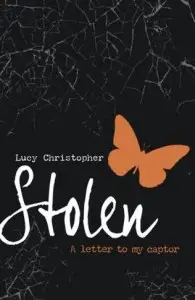
Stolen , by Lucy Christopher
, by Lucy Christopher
A sixteen year old girl is drugged in South-East Asia and abducted back to Australia where she finds herself face to face with a man who is a little on the obsessive side (but also really good looking as Gemma discovers). Without giving away too much, this story explores the complicated relationship between a captor and a captive.
A sixteen year old girl is drugged in South-East Asia and abducted back to Australia where she finds herself face to face with a man who is a little on the obsessive side (but also really good looking as Gemma discovers). Without giving away too much, this story explores the complicated relationship between a captor and a captive.
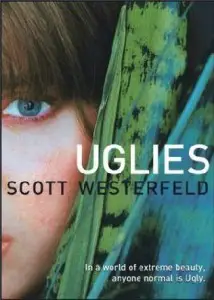
Uglies (Uglies Trilogy, Book 1) , by Scott Westerfeld
, by Scott Westerfeld
The first in a quadrilogy (Uglies, Pretties, Specials, Extras) set in a future where everyone undergoes radical plastic surgery at the age of sixteen to become a Pretty. Up until that time all kids are kept in Ugly Town and away from all the good things in life. Once a person becomes Pretty they enjoy living the life of endless parties. This story is speculative fiction focussing on humanity’s obsession with looking ‘perfect’ and the concessions people may have to make to gain that perfection. The hero, Tally, is unfortunate enough to uncover something sinister about the process of becoming Pretty, but even with her pluckiness and luck, is one person going to be able to make a difference? Yeah, it’s a familiar story but Westerfeld’s attention to detail in this future-world is brilliant.
The first in a quadrilogy (Uglies, Pretties, Specials, Extras) set in a future where everyone undergoes radical plastic surgery at the age of sixteen to become a Pretty. Up until that time all kids are kept in Ugly Town and away from all the good things in life. Once a person becomes Pretty they enjoy living the life of endless parties. This story is speculative fiction focussing on humanity’s obsession with looking ‘perfect’ and the concessions people may have to make to gain that perfection. The hero, Tally, is unfortunate enough to uncover something sinister about the process of becoming Pretty, but even with her pluckiness and luck, is one person going to be able to make a difference? Yeah, it’s a familiar story but Westerfeld’s attention to detail in this future-world is brilliant.
Just before I finish, there is often talk about boys not reading, so I’d like to let you know that Hunger Games and Right Behind You have been great successes. I’m an English teacher at a high school and have taught these books to boys and girls, both of whom have devoured them with equal intensity!

I do think you should have it separated. As a teen, I appreciated this, though I was a precocious reader and read mostly adult books. As an adult, I always check out the YA sections in the library and stores. Make the area a bit “edgy,” and I think you’ll have a winner.
Shreve of The Daily Coyote was also expressing her admiration for The Hunger Games just last week. I always start my morning by checking the Daily Coyote site and seeing what Charlie is up to, and had not quite decided if her few words of stunned admiration had talked me into trying it. This might, though.
I really liked Nick and Norah’s Infinite Playlist and it could be something that could be revisited by adults later in life and still be good. There’s a book recently that I checked out called Mojo by Kris Sedersten that could be enjoyed by both young adults and people in their mid-twenties like myself.
I’d say separate it – but do you have to label it? (I understand if you’re so huge that you need big signs that can be seen across the store saying what’s where.) If you do, is there a way you can phrase it that doesn’t scream “for teens only, you’re a perv if you are older and come in here”? (Incidentally, that’s the policy at the library where I work – the teen room, where the YA books are kept, is for the teens only, and adults can’t really browse – they can come in for a specific book only; if they browse for more than a few minutes, they’re told to leave.)
Try this book of reviewed books for teens:
The Ultimate Teen Book guide Daniel Hahn, Leonie Flynn, Susan Reuban.
I have found that our parents appreciate that we separate our Teen section from the general fiction and the teens appreciate having their own section which is separated from the kids books.
A lot of the current hot selling paranormal romance books are Teen fiction, it is handy to me as a bookseller to have those separated from the more racy adult paranormal books.
And I do have a lot of crossover with adults who buy from the Teen section and only read teen fiction as well as a few teens, with parents permission who buy from the adult paranormal section.
Some parents don’t care and some do so by separating them, I am letting the parent make the final decision.